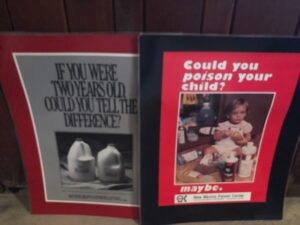I was reminded of something I heard years ago, “Everybody has three lives: a public one, a private one, and a secret one” (A Hundred Years of Solitude, Gabriel Garcia Marquez), when I blurred the lines, walking to the mailbox in my slippers and sleep shorts.
Our mailbox is located along a well-traveled rural route, but I was hoping I could get away with it this once, but no. Not one, but two vehicles passed while I deposited my mail, hoping to do so invisibly.
It was decades ago, when living in a downtown apartment across from a popular night-spot, my husband beckoned me to the sidewalk to see something, the sky perhaps. I had just applied a facial mask, which was doing its thing to tenderize my skin. He assured me that we would be seen by no one.
Not so much that time, either. Some relatives of relatives were entering the bar and hollered a cheery greeting. I was caught both times that I relaxed the rules on my public versus private self.
I’ve worn makeup to go out since I was a teenager. Even though I work from home, I get up and dress every day, and when I go out to run errands, I dress in business casual attire.
I’m not sure of the motivations of other people, but mine, on that day, was not an “I don’t give a hoot what others think,” or “I’ll wear whatever I want to my own mailbox.” It was a practical rather than a rebellious act.
It was such warm weather, it bordered on hot. As an aside, back in the 70s, before the word was used to describe “sexy,” my friend’s boss once told her that the word “hot,” was crude and should never be used to describe extreme heat. Instead, the more appropriate descriptor is “very warm.” It seems a little Downton Abbey-ish to avoid a word for the sake of decorum, but I still halt for a moment before saying it’s hot outside.
At any rate, to excuse my wearing sleepwear to the mailbox, it was hot outside. I don’t react well to heat and humidity, physically or cosmetically. I was simply not ready yet to dress in my going-out clothes, and the mail needed mailing….
You and I have both seen many a male wear pajama bottoms, as day-wear. “Lounge-pants,” some guys call them. Don’t get me started on the regular trooping of pj’s at Walmart. To each his/her own. But, that’s not me.
I grew up even more rural than I live now, with no immediate neighbors. So, I’m not sure where I learned the concept of the private back yard versus the public front yard. But I know the concept in my bones.
In this unspoken protocol, family, friends, and neighbors come to the back door and strangers, service professionals, and acquaintances are welcomed at the front door. It’s to distinguish between one’s public and private selves, I guess.
It’s similar with the back yard versus the front yard. The front yard is usually formal and doesn’t disclose who you are. The back yard is, in contrast, casual and separated for play, projects, and open to people who know you: family, friends, and neighbors talking over the, sometimes imaginary, fence or hedge.
Neither of these selves, the public nor private one, are secret. In fact, I imagine the secret self is relegated mostly to the unconscious – secret even to the self.
We’ve been working feverishly on our yard throughout this pandemic quarantine period. To say that we have a lot of trees, would be an understatement. We’ve been the collection point for several teenagers of friends and acquaintances from the area, completing a science assignment to assemble leaves from a wide variety of local trees.
I’m not whining about yard-work being a lot of work, because we made our bed and are happily lying in it. But it’s still a lot of work and not being native to 90-degree weather and oppressive humidity, it’s been work that is taxing on our growing-older bodies.
We pretty much have the front yard, including our side yard with a small apple orchard dominating it, under control. The side yard with seven new apple trees, trellised and espaliered, and the rotting grape arbor torn down and replaced by training poles to make grape-trees out of the plants, is also well on its way to the new norm. That’s with the exception of the semi-annual shed clean-out.
We’ve made our way to the back yard, which requires a number of seemingly trivial projects, but again each one will be backbreaking but will massively clean up the casual space where we welcome friends, family and neighbors.
Speaking of neighbors, what is it they say about neighbors? I know what the Scriptures say, “love thy neighbor as thyself.” But, it’s the other one that just slips my tongue, oh yes, “good fences make good neighbors,” from a Robert Frost poem, “Mending Wall.”
Our neighbors are welcomed to our back yard. We’ve all shared tools and tips, advice and condolences, picked some folks up when they’ve fallen in the vicinity, literally, and retrieved one another’s wind-tossed belongings: “here’s your lamp globe;” “your cat’s collar was under my truck;” “we saved your grill cover in that wind storm.” …
And, we share stuff, or I guess it’s technically borrowing the proverbial cup of sugar: “do you need some green beans?” “Here are some tomatoes.” “May we borrow your extra-large wrench?” “Do you have an egg I can borrow until I get to the store tomorrow?” “We’re never going to eat those popsicles the delivery man gave to us; would your kids like them?”
Neighbors have come and gone over the nearly thirty years we’ve been in this spot. Some have been here about as long as us. And, we’ve had disagreements over the years – always involving boundaries, thus the fence/hedge cliché, but always mended our differences into a neighborly configuration of friendliness, if not agreeing to disagree.
I guess that’s where the “love they neighbor” thing comes from. It’s a version of the Golden Rule, “do unto others as you would have them do unto you.” We’re all flawed. We all make mistakes. No one is perfect. We’re only human. These are the truths that live in the back yard as opposed to the “date face” that we present in the front yard.
I’ll leave you with this placard, which my neighbor mentioned when she recently dropped over to our work-in-progress back yard, “backdoor guests are best.” This sentiment, along with its mentality, has been around since the olden days and we’re fortunate to live in a rural area where the idea of neighborliness and the Golden Rule, still rule. Amen?









 from my human sexuality classes that would fit right into the décor of your and my gynecologist/obstetrician’s office;
from my human sexuality classes that would fit right into the décor of your and my gynecologist/obstetrician’s office; posters from poison control used at a booth at a health fair my college committee on the environment sponsored
posters from poison control used at a booth at a health fair my college committee on the environment sponsored and a board game I created for my American Subcultures class.
and a board game I created for my American Subcultures class.